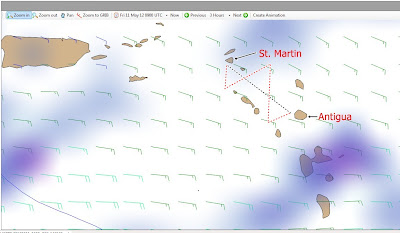Our time in the States seemed to fly, although when we got
there in June, we thought we had forever to enjoy life ashore. It’s always a pleasure to see family and
friends when we’re back there, but we can’t help being shocked by the contrasts
to the simple life to which we’re accustomed.
There are so many people, moving so fast. Apparently, they are all searching for
something that eludes them, because they seem never to stop. Individually, our countrymen are friendly and
kind, but our society comes across as fast-paced, uncaring, and acquisitive to
the point of obsession.
Shortly before we left on our return journey to the islands,
we went grocery shopping at a discount department store with our daughter. As she and Leslie browsed the grocery aisles,
which took up maybe 15% of the store’s space (!), I stood in the front
right-hand corner and gazed diagonally across the store. The back left-hand corner was so far away
that I couldn't make it out clearly, and I can pick out man-sized buoys at sea
at a distance of well over a mile. I was
awestruck. This one store could shelter
the entire population of some of the countries that we visit, and it was
stocked with more merchandise than the islanders could find in their whole
country. When we got back to her house,
our daughter realized she had forgotten something. “We’ll stop on the way to pick up Elise from
school,” she said. School was in a different
direction from our morning outing, and she stopped in another store of the same
chain, equally big, equally crowded, and equally well stocked. It was no more than a few miles from the one
where we had stopped earlier.
Now we’re back where the stock in even the gourmet grocery
store depends on “what de boat brought las’ time.” Life has taken on a more personal quality
again. While I got Play Actor ready to launch after her five months out of the water,
Leslie walked a couple of hundred yards from the boat yard to the government
office at Jolly Harbour to deal with Customs, Immigration, and the Port
Authority. The senior Customs officer
greeted her with a, “Welcome back, Captain.
It’s been a long time since you las’ visit.”
“You haven’t been working here for the last year or two,”
she responded.
“No. I’ve been
working at the airport. It’s good to be
back where I know the people I deal wit’.”
After she finished with the paperwork, the yard crew had the
boat back in the water and we took her out to a mooring and launched the
dinghy, returning to the yard office to settle up our account. That taken care of, we walked across the
street to the Epicurean Market to pick up some necessities, including fried
chicken for lunch.
“You have no bananas,” Leslie remarked to the cashier as she
rang us up.
“De boat from Dominica don’t bring one time. Nex’ week, mebbe so.”
We went back to Play
Actor and put up an awning. Sitting
in the shade eating our chicken, we were entertained by watching several
geckos at our feet chasing bugs. They moved aboard in our absence, apparently. When we're in residence afloat, it's a bit like living in a castle with a moat. Crawly creatures can't come to see us unless we (inadvertently) bring them aboard. We have
a whole new ecosystem now, just in our cockpit. We contemplate our new neighbors as we eat. We could do without the bugs, but the geckos are kind of cute. We decide to see if they can handle our bug problem instead of spraying with insecticide, as we usually do after taking the boat out of storage. Of course, we'll eventually have to start feeding the geckos; there aren't many bugs except ashore. Nex' week, mebbe so. It’s good to be home.





























